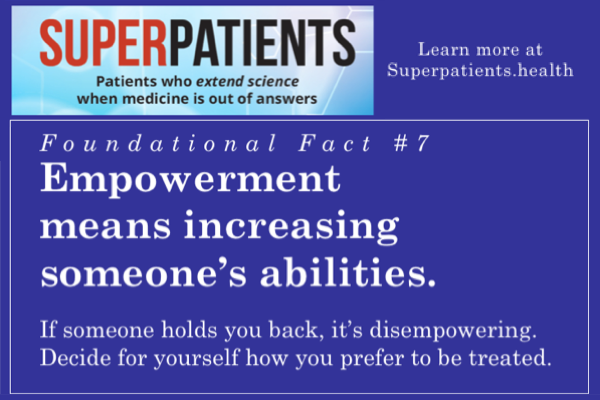Next in the series of fourteen foundation truths about Superpatients.

When you’re at the frontier of medical knowledge and you don’t have medical training, it makes all the difference in the world whether you can do something about that – whether you can improve your capacity to produce results. It’s useful in that situation to know what to look out for.
At the health conferences where I make my living, everyone talks about patient empowerment, but from what I hear on the streets, not much has changed. Most importantly, people still talk about being unable to get their medical records. In advocating for best possible care, I’ve found it useful to point this out, to patients and professionals alike.
Here are some examples:
EMPOWERING
- Helping someone understand something, or do something, increases their ability.
- Giving people their medical records, if they want them
- Giving people accurate cost information
- Writing clearly, at a level the person can understand. (As I said in Let Patients Help, Clarity Is Power.)
DISEMPOWERING
- Expecting people to figure it out themselves
- Withholding their records, foot-dragging, overcharging
- Withholding cost information; surprise bills
- Hard-to-read information and bad illustrations.
As regular readers know, the definition I use comes from the World Bank, which for decades has been going into developing nations and learning what it takes to empower citizens. I learned about it in 2013 (from a patient, not an academic!), blogged about it in 2016, then created a nine minute “slidecast” video explaining how empowerment and engagement fit together to expand healthcare’s potential.
Here’s to clinicians who truly empower.
My hat is off to the healthcare providers who are genuinely empowering people to be more effective, and who welcome patient involvement. They extend what’s possible.
Next in the series: #8 Paternal caring is rooted in good intentions but it’s based on expired truths. Don’t let it kill you.


Leave a Reply